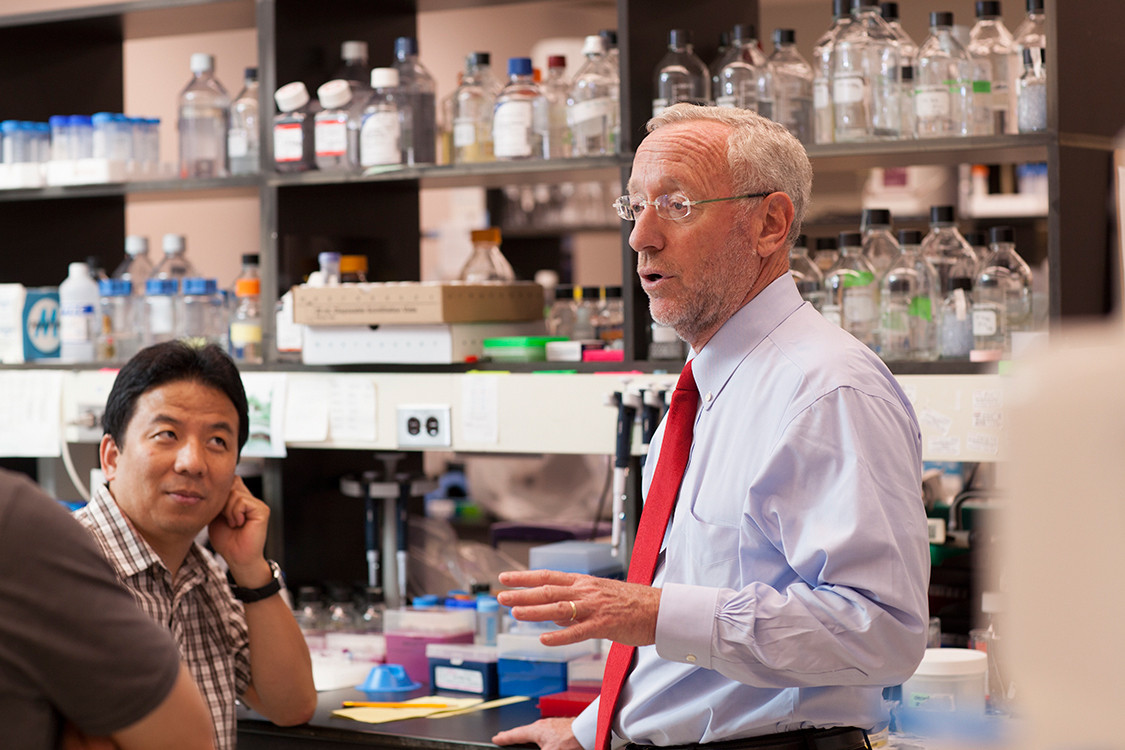Provost launches initiatives supporting 'radical collaboration'
By Joe Wilensky
“The faculty is the university,” Cornell Provost Michael Kotlikoff says. It’s a simple statement that speaks volumes.
He readily elaborates: “The faculty do the discovery, they apply those discoveries, and they teach and inspire our students. It’s really impossible to overestimate the role of the faculty at Cornell – they really are what is permanent and fundamental about our academic institution.”

To keep Cornell’s world-class academic departments at the top of their fields and advance the university’s reputation as a premier research institution, while also addressing Cornell’s challenge to hire a new generation of teachers and researchers, Kotlikoff is launching an ambitious series of initiatives to enhance faculty hiring.
They target and elevate strategic, “radically collaborative” discipline areas that point the way toward the discoveries and solutions of tomorrow: nanoscale science and molecular engineering; genome biology; data science; sustainability; the social sciences; infection biology; and the humanities and arts. Each area will have a dedicated task force led by faculty members.
It’s a hybrid approach, like so many parts of Cornell: collaborative and balanced, partly centralized and partly given over to the individual colleges to determine their own priorities and objectives. Kotlikoff’s approach, applied through the Office of the Provost and working closely with Senior Vice Provost for Research Bob Buhrman, is half organic: It encourages the growth of self-organized initiatives and needs that have bubbled up naturally from departments and faculty members, while it brings administrative muscle, funding and assistance to cross-college and cross-campus efforts.
In addition to the pressing task of bringing in brilliant young researchers and teachers, along with star faculty already making names for themselves in their fields, is the need to retain existing faculty – “in an increasingly competitive environment,” he says.
Kotlikoff notes that Cornell has “lost several excellent faculty to recruitments by other universities over the last several years. We’ve been in a position in which we’ve not been as aggressive as other institutions, largely because of financial pressures felt by colleges and schools and a lack of central resources; so now it’s really time to address those head on, to provide a sense of momentum at the institution and invest in academics.”
A good example of the approach is the effort in the field of nanoscience. Its target is making 10 midlevel or senior hires over the next five years in an area that, Kotlikoff says, will have a major impact on a number of departments within several colleges.
“Part of Cornell’s advantage in this recruitment effort is the fact that we are such a collaborative environment,” Kotlikoff says, noting the focus on nanoscience was initially organized by faculty members themselves, who came to him with the idea for prioritizing recruitments while also generating excitement across their departments and supporting nanoscience faculty already here. It “is a great example of the collaboration among physics and chemistry in Arts and Sciences, a number of Engineering departments, departments in Human Ecology and the College of Agriculture and Life Sciences, as well as others,” he says.
Each initiative involves a research focus of at least eight separate academic departments from a minimum of four colleges, creating more faculty interactions across the Ithaca campus and between Ithaca and Cornell’s New York City campuses. They will build strength, bolster recruitment and organize infrastructure.

“I like to think about Cornell as a place with no fences, with no barriers to collaboration. And these initiatives will really highlight that,” he says.
Baked into these initiatives is a built-in boon to recruitment, Kotlikoff notes. “It’s to create a sense of forward motion in these areas that attract individuals to join something that is beyond one department. I’m acutely aware of the fact that the reason I’m at Cornell is that I was attracted by one such initiative, the genomics initiative, in which the recruitment effort looked for a ‘university scientist’ rather than a researcher simply coming into a single department.
“You were recruited as part of a community, by multiple departments, and as a scientist, you entered and started immediate collaborations,” he says. “That’s a very seductive and attractive presentation to a potential faculty member.”
At the same time, Kotlikoff is mindful not to overemphasize the provost’s office role. “The primary responsibility for academic excellence lies within the colleges, and they have to have the ability – the financial ability and the strategy – to enhance their own objectives, many of which may not be multidisciplinary or multicollege,” he notes.
An example? Cornell is world class in astrophysics in the College of Arts and Sciences. “We’re going to continue to be world class in astrophysics, and invest in astrophysics and other areas like that,” he says. “So by not having an initiative around astrophysics, we’re in no way diminishing the importance of that for the university – and I can name dozens of other just superb programs that we will continue to promote and support and make sure the colleges have the financial ability to succeed in enhancing their own stature.”
In addition to the new initiatives, Kotlikoff is working on boosting recruitment of diverse faculty and dual-career hires. He is funding hiring incentives through his office and working with college deans to create an additional recruitment and retention advantage throughout Cornell’s campuses.
He also is working with Interim President Hunter Rawlings on limiting the growth of what has been called “shadow work” – a shift of the burden of paperwork and compliance with approvals and regulations onto faculty members themselves, limiting their productivity and creativity.
Over the next couple of years, Cornell will be aligning its strategic fundraising initiatives around this investment in academics, Kotlikoff says, both on the multidisciplinary side and in the university’s traditional areas of strength.
“These initiatives will help us recruit the faculty who will ensure Cornell’s future excellence, inspiring our students and creating new knowledge that will influence the world,” Kotlikoff says. “Cornell students, parents and alumni should expect us to be constantly challenging ourselves about what we’re doing, re-examining our efforts and thinking about what every student needs in the 21st century.”
That ongoing re-evaluation – along with a spirit of community and collaboration and across-the-board support for hiring faculty who will shape this world-class university’s reputation and the student experience in the coming decades – is the essence of its success, he says.
Media Contact
Get Cornell news delivered right to your inbox.
Subscribe